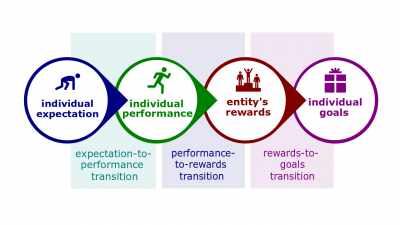Difference between revisions of "Expectancy theory"
(→Related coursework) |
MariamKhalid (talk | contribs) |
||
| Line 4: | Line 4: | ||
According to [[Organizational Behavior by Robbins and Judge (17th edition)]], | According to [[Organizational Behavior by Robbins and Judge (17th edition)]], | ||
:[[Expectancy theory]]. A theory that says that the strength of a tendency to act in a certain way depends on the strength of an expectation that the act will be followed by a given outcome and on the attractiveness of that outcome to the individual. | :[[Expectancy theory]]. A theory that says that the strength of a tendency to act in a certain way depends on the strength of an expectation that the act will be followed by a given outcome and on the attractiveness of that outcome to the individual. | ||
| + | According to [[Management by Robbins and Coulter (14th edition)]], | ||
| + | :[[Expectancy theory]]. The theory that an individual tends to act in a certain way based on the expectation that the act will be followed by a given outcome and on the attractiveness to the individual. | ||
==Related lectures== | ==Related lectures== | ||
*[[Human Motivations Quarter]]. | *[[Human Motivations Quarter]]. | ||
| − | [[Category: Septem Artes Administrativi]][[Category: Articles]] | + | [[Category:Management]][[Category: Septem Artes Administrativi]][[Category: Articles]] |
Latest revision as of 15:33, 3 June 2020
Expectancy theory (hereinafter, the Theory) is the theory that suggests that an individual tends to act in a certain way based on the expectation that the act will be followed by a given outcome and on the attractiveness to the individual. The path-goal model has been developed based on that Theory.
Definitions
According to Organizational Behavior by Robbins and Judge (17th edition),
- Expectancy theory. A theory that says that the strength of a tendency to act in a certain way depends on the strength of an expectation that the act will be followed by a given outcome and on the attractiveness of that outcome to the individual.
According to Management by Robbins and Coulter (14th edition),
- Expectancy theory. The theory that an individual tends to act in a certain way based on the expectation that the act will be followed by a given outcome and on the attractiveness to the individual.
